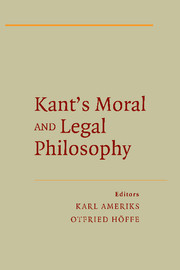Book contents
- Frontmatter
- Contents
- ACKNOWLEDGMENTS
- CONTRIBUTORS
- WORKS BY KANT
- Introduction
- I EARLY CONCEPTIONS
- II GROUNDWORK OF THE METAPHYSICS OF MORALS
- 3 What Is the Purpose of a Metaphysics of Morals? Some Observations on the Preface to the Groundwork of the Metaphysics of Morals
- 4 The Transition from Common Rational Moral Knowledge to Philosophical Rational Moral Knowledge in the Groundwork
- 5 Reason Practical in Its Own Right
- 6 Kant's Justification of the Role of Maxims in Ethics
- III CRITIQUE OF PRACTICAL REASON
- IV LEGAL AND POLITICAL PHILOSOPHY
- BIBLIOGRAPHY
- INDEX
4 - The Transition from Common Rational Moral Knowledge to Philosophical Rational Moral Knowledge in the Groundwork
Published online by Cambridge University Press: 13 November 2009
- Frontmatter
- Contents
- ACKNOWLEDGMENTS
- CONTRIBUTORS
- WORKS BY KANT
- Introduction
- I EARLY CONCEPTIONS
- II GROUNDWORK OF THE METAPHYSICS OF MORALS
- 3 What Is the Purpose of a Metaphysics of Morals? Some Observations on the Preface to the Groundwork of the Metaphysics of Morals
- 4 The Transition from Common Rational Moral Knowledge to Philosophical Rational Moral Knowledge in the Groundwork
- 5 Reason Practical in Its Own Right
- 6 Kant's Justification of the Role of Maxims in Ethics
- III CRITIQUE OF PRACTICAL REASON
- IV LEGAL AND POLITICAL PHILOSOPHY
- BIBLIOGRAPHY
- INDEX
Summary
The Groundwork of the Metaphysic of Morals is the first work in which Kant speaks explicitly of conceptual ‘transitions’ from one sphere or domain to another. But Kant never made clear precisely how these transitions are to be understood or what their systematic function within the overall structure of the Groundwork ultimately is. No one disputes the fact that Kant always emphasised the central importance of systematic methodological considerations for philosophical reflection. In the Preface to the Groundwork itself, he refers explicitly to ‘the method employed in this text’ (Gr:392, 17) and to the ‘path’ he has pursued in relation to the entire project of a metaphysics of morals (Gr:392, 22). Whereas the Groundwork as a whole proceeds analytically, the metaphysics of morals he intends to publish ‘someday’ in the future will be constructed synthetically (Gr:391, 16). Kant says, it is true, that the internal structure of the Groundwork ‘turns out consequently’ as it actually does (Gr:392, 22, my italics), articulated clearly in its three well-known sections. But it is not immediately obvious why a specific transition [übergang] is involved in each of these sections. And nor, as we have pointed out, does Kant really explicate the character of these transitions any further.
In all the literature surrounding the Groundwork, we find that very little attention has been paid to this problem.
Keywords
- Type
- Chapter
- Information
- Kant's Moral and Legal Philosophy , pp. 93 - 122Publisher: Cambridge University PressPrint publication year: 2009
- 1
- Cited by

